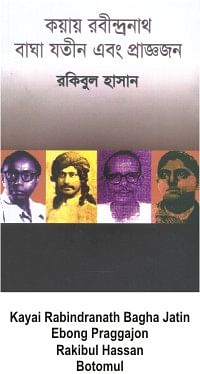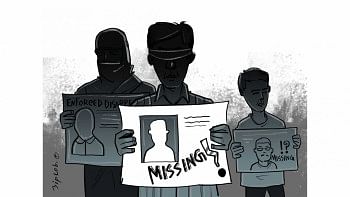Tales of the famous and the brave

Looking through the prism of life these days, one wonders how far one has strayed from one's roots, become oblivious of the glory that was there in the past that constitutes one's existence. With this feeling and realization that emanates from it when one looks back, one sees trails of stories both elating and saddening that are stashed in every nook and cranny of predominantly rural Bangladesh. One such village lying by the river Gorai in Kushtia is Koya --- an appealing name in itself that moulds an image of a tiny chirping bird in the vision of this reviewer. It takes someone with an immense sense of responsibility and a heart full of passion to weave the things that, although discrete in terms of chronology, are yet arranged into a colourful tapestry. Rakibul Hassan has fulfilled just this task in a masterly way.
Koya, a village adjoining Shilaidaho --- another village that is intertwined with memories of Tagore --- was blessed with his august visit in 1923. Koya not only is distinguished as a village that bears the footmarks of Tagore, but also is the celebrated spot that inspired Tagore to pen his poem Dhulamondir, included in Gitanjali. This poem was written thirteen years before Tagore actually set foot in Koya. Most probably it was written sometime as he journeyed by boat on the river Padma that took him through the distributary, the Gorai, that flows past the picturesque village of Koya. The thought that is overriding in Dhulamondir is having seen the common people working so hard keeping themselves absolutely close to nature, Tagore felt that in essence the Creator lies in the temple dust of commoners rather than within the fours walls of a temple built by men. The well-known song "Shimar majhe ashim tumi bajao apon shur" was also written in the same course of his journey by boat at Janipur, Khoksha, Kushtia --- it remains the guiding principle in Tagore's philosophy of transcendentalism.
Koya indeed is a lucky village that witnessed the birth of illustrious sons like Jyotindranath Mukhopaddhaya, fondly called Bagha Jyotin, the great novelist of the 1950s and 1960s; Akbar Hossain, the committed worker and leader of the Communist Party; Brojen Biswas and many others. Talking about Bagha Jyotin, who would not be surprised hearing the stories of his immense courage that started budding early in his life primarily through the determination and active involvement of his widowed mother Sharotshashi Devi? She was the living embodiment of inspiration in his life. In his childhood, he was told stories by his mother at bedtime that were not fairy tales but were about life, struggle and the sacrifices of men devoted to a cause they deemed noblest to pursue notwithstanding the hazards that those entailed. The hair-raising story of Jyotin's killing of a tiger all by himself that earned him the title of 'Bagha Jyotin' is an adventurous chapter in our history that all youngsters of our country must know. Equally heroic is the real life drama, when Bagha Jyotin along with only four of his companions fought the well-equipped and well-trained British soldiers for three long hours. The sacrifices of this great patriot were richly eulogized by Tagore, Nazrul, Deshbandhu Chittaranjan Das, the well-known revolutionary MN Roy and many others. The writer laments that in this part of Bengal, although we observe the birth and death anniversaries of so-called leaders, we remain totally oblivious of these occasions centering on heroes of the stature of Bagha Jyotin. Indeed, it is a shame that speaks volumes of our misplaced perceptions and warped sense of history. And it ironically remains the same in Bangladesh as is evident from the skewed evaluation of the leaders of the nation by many.
The story of Bagha Jyotin is not complete without mention of his only sister Binodbala, who combined within herself a number of laudable qualities as her mother had. It is noteworthy that way back in the nineteenth century, for a young girl coming from a remote village, Binodbala had her education in the English medium at a time when educating a girl child was itself considered a sin. Nevertheless it was decided and done because of the sagacity of her mother. The sister remained the bedrock in the life of Bagha Jyotin, upholding his commitment to the country first and foremost although not much is known about this enlightened and indomitable personality. The same social perception exists today even in the 21st century when it comes to recognising the contributions of women to any justifiable cause.
Next, the author dwells on the literary genius Akbar Hossain, who ranks high not only among the Muslim novelists of the nineteenth and twentieth century but also among others. One very magical prophecy by Tagore about Akbar Hossain when the latter was a little boy of seven years is narrated by the author. Way back in 1923, Tagore made an unscheduled stopover at Akbar Hossain's home and was so much charmed by the way he recited two of his poems that he blessed this young lad by commenting that some day he would become a great poet, which turned out to be true not exactly in that sense but in Tagore's uncanny foresight signs of genius were obvious. Abanchhito, Akbar Hossain's first novel, was a great sensation among readers. He wrote it in only eighteen days when he was a student of the BA class. It is most heartening to know that having read the summary of Abanchhito, the renowned film director Sushil Majumdar was so impressed that he expressed his desire to make it into a film, which plan unfortunately did not materialize due to the outbreak of a bloody riot in India. Akbar Hossain's bold novel Dushtokhato, written in 1981, portrays the atrocities committed by the Pakistanis on the innocent Bengalis in a very concrete way.
In his next essay, Hassan narrates the mindless killing of all three earning male members of a family in Koya. As if taking the life out of them was not enough, the murderers merrily engaged themselves in mangling the bodies beyond recognition an incident that has been repeated recently in the BDR carnage at Pilkhana, exposing the ruthlessly beastly nature in us, the so-called human beings. It is most regrettable, as the author points out, that in spite of a number of influential people wielding power in their locality who could come to the aid of such a family, no one cared for them. It was only Begum Anjuman Ara Jamil, wife of Col Jamil, who as the lawmaker from this constituency went forth to address the plight of this family for herself and helped them with cash and kind. This tragic story of Renu Nessa is one of the millions of incidents perpetrated by the hyenas of the Pakistan army as they went on a killing spree dictated by their ferocious and obtuse masters.
In the last chapter of the book, the author portrays a person having such qualities in his character that are not only rare in these days but perhaps may never be again. The height of commitment to the cause of the downtrodden, self-denial to attain a goal despite being troubled by financial and other associated constraints, never to compromise one's ideals in the face of threats of any kind, imaginable or unimaginable for realizing personal advantage were some of the landmarks in the person of Brojen Biswas. They sound like fairy tales because such personality traits do not exist any more in most of people, let alone among politicians who recognize only power, not principles. In every sense of the term, Brojen Biswas was a complete man, an ideal person to look up to, one who dies a physical death only but remains immortal.
The preface of the book by Dr Shahid Iqbal is a highly scholarly discourse that enlightens a reader thoroughly. In spite of the sparkling look of the pages, reading is marred by a number of printing mistakes one comes across every now and then.
Rakibul Hassan has done a great job by bringing back some almost lost names and placing them once again in the mirror of our mind. It is a task of both pride and job for the author and for all of us at the same time.

 For all latest news, follow The Daily Star's Google News channel.
For all latest news, follow The Daily Star's Google News channel. 



Comments